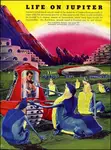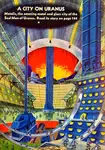- Home
- Your Views
- Part Eight of The Archives of the Moon
Part Eight of The Archives of the Moon
by Robert Gibson
(Lancashire, England)
VIII
The very words themselves were revolutionary. While Dzhaoo spoke them, he looked up into the eastern sky. There, a great globe hung motionless: Urom, the giant companion-world around which Yyu revolved.
Heavily suffused by authorial hints, the scene injected into Royden, the reader of this tale, the idea that the fate of Dzhaoo and Vaphru would become linked in some way with that planet bulging in the sky.
Royden’s own knowledge combined with the Selenite narrative enabled him to identify “Urom” with the Earth of the Permian period, and this helped him to orient himself in the vastness of time while he watched the ancient story unfold, so that, discerning the shape and size of the land beneath the flecking of Urom’s clouds, he thought to himself: that is the supercontinent of Pangaea; my mind is some two hundred and fifty million years in my body’s past; the Earth I see is close to the end of its Palaeozoic era.
Then as a movie cuts from one scene to another the focus of the narrative returned to Dzhaoo and Vaphru. Fain were they to remain alone along the soothing groves, to explore their supernal idyll of new-found mutual love, but the return to Vaphru’s home city was urgently necessary. In Atth, if anywhere, they would find support against the fury of Pihinxin which must shortly be aroused.
Strolling onto the beach of amber shards which marked the sinuous shore of Zpibaraz, they observed that the wide blue sky was fortunately empty of flying beings, so that none might note their departure. Then, unfolding their transparent vanes of fine gauze, Dzhaoo and Vaphroo leaped into flight, choosing speed rather than stealth as they soared over the specular ocean.
The return journey to Atth took half a Yyr day. Later they looked back upon this time as a precarious joyance, shot through with presentiments of tragic conflict. The fugitive pair held to a northward course which, after two days of unmolested flight, brought them over the pole of Yyu. The swarm of Ningyl, which inhabited this boreal region, received them with hospitality, and accorded Vaphru the courtesies due to a sovereign. She felt tempted to confide in them, but the hints by which she essayed to test opinion did not, after all, elicit any sign of those progressive habits of thought which had recently become vital to her. So she kept her newly acquired opinions to herself, and did not dare to risk the disclosure of that status which she had conferred upon her companion. Consequently her host the King of Ningyl knew no better than to arrange for Dzhaoo to be lodged among underlings while Vaphru was left in lonely state to tour the high parks with their mauve swards, among the nigrescent pinnacles and rare clouds of this remote realm; but she was comforted by the thought that Dzhaoo remained within sight among her attendants.
Southward the two Atthans flew after their brief rest in Ningyl; southward into the other hemisphere of Yyu. They sped through many lands on their way home, but in none did they think it worth while to solicit liberal endorsement of their liaison. The attempt having failed in Ningyl, it would surely fail in other foreign lands. Only in their home city might they hope for that public complaisance which Queen Vaphru had a right to expect from her own swarm; and glad were the travellers when at last they descried the vertiginous porphyry hive of Atth from afar.
Proud and tall it stood amid the surrounding marish, of which the reeds, flashing like an encircling army of quivering spears, partially hid the vermiculate hordes which pastured therein. Above this contado the homecoming monarch was met by a party of deferential subjects, who escorted her and her companion through a lofty portico into the heart of her domain.
In the apical chamber atop the central newel of Atth, Queen Vaphru resumed her royal vantage at the city’s hub of communication.
Her attendants perched on coigns, awaiting commands, or flew to and from the throne bearing firkins and salvers of choice viands and liquids; other servants flitted to adjust the seeing-tubes about the throne, to enable the monarch to supervise scenes beyond the waxen walls. Vaphru was thus able to survey the entire population which swarmed among all the cotes and esplanades on all the levels of Atth.
The order went out that all members of the swarm – except the outermost guards – should gather at the lower outlets of the seeing-tubes. Thus assembled, her subjects gazed at Vaphru, and heard her also, by a supplementary telaudition, announce to them that she had chosen Dzhaoo as her consort.
No whisper of protest or even surprise was heard from the plebeian multitude. A yet more remarkable testimony of loyalty was furnished by the similar acquiescence of the royal brood, the siblings of Vaphru who had congregated in her presence. Every one of them obediently bowed to him who stood beside their Queen, and submissively awaited dismissal or else a further expression of will from the throne.
However, the silence was broken from a different direction –
Comments for Part Eight of The Archives of the Moon
|
||
|
||


































